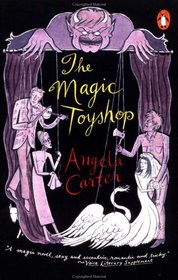Having just finished Carter's 'The Bloody Chamber,' her retellings of traditional fairy tales, I thought I'd read something else by her in order to have a basis for comparison.
The Magic Toyshop is, firstly, much more horrific and disturbing than the cute cover of this edition would lead one to expect. It's full of over-the-top elements of gothic grotesquerie - I can almost imagine the author, while writing, gleefully exclaiming, "oh yes! I know what will make this Even Worse!!!" - but it's very well written, and therefore emotionally very effective, even while one is saying, "well, that's a Bit Much!" Upon finishing it, I was left with a creeping, disturbed feeling - which is the sign of a good horror novel.
However, I did have the same issue with it as I did with the stories in 'The Bloody Chamber,' which is that the characters are both emotionally opaque and oddly passive. Even when dramatic events occur, the reader doesn't get the sense that decisions have been made that set those events in motion. Instead, there is a sense that it was inevitable that events would unfold the way they did; that the characters do not have free will. Carter is too good a writer for this to be unintentional; perhaps it reflects her world view. Personally, however, I find it bothersome.
The Magic Toyshop is, firstly, much more horrific and disturbing than the cute cover of this edition would lead one to expect. It's full of over-the-top elements of gothic grotesquerie - I can almost imagine the author, while writing, gleefully exclaiming, "oh yes! I know what will make this Even Worse!!!" - but it's very well written, and therefore emotionally very effective, even while one is saying, "well, that's a Bit Much!" Upon finishing it, I was left with a creeping, disturbed feeling - which is the sign of a good horror novel.
However, I did have the same issue with it as I did with the stories in 'The Bloody Chamber,' which is that the characters are both emotionally opaque and oddly passive. Even when dramatic events occur, the reader doesn't get the sense that decisions have been made that set those events in motion. Instead, there is a sense that it was inevitable that events would unfold the way they did; that the characters do not have free will. Carter is too good a writer for this to be unintentional; perhaps it reflects her world view. Personally, however, I find it bothersome.
From the back cover:
A Startling tale of redemptive power of physical and emotional love.
One night Melanie walks through the garden in her mother's wedding dress. The next morning her world is shattered. Forced to leave the comfortable home of her childhood, she is send to London to live with relatives she has never met: Aunt Margaret, beautiful and speechless, and her brothers Francie, whose graceful music belies his clumsy nature, and the volatile Finn, who kisses Melanie in the ruins of the pleasure gardens. And brooding Uncle Philip loves only the life-size wooden puppets he creates in his toyshop. This classic gothic novel established Angela Carter as one of our most imaginative writers and augurs the themes of her later creative work.
A Startling tale of redemptive power of physical and emotional love.
One night Melanie walks through the garden in her mother's wedding dress. The next morning her world is shattered. Forced to leave the comfortable home of her childhood, she is send to London to live with relatives she has never met: Aunt Margaret, beautiful and speechless, and her brothers Francie, whose graceful music belies his clumsy nature, and the volatile Finn, who kisses Melanie in the ruins of the pleasure gardens. And brooding Uncle Philip loves only the life-size wooden puppets he creates in his toyshop. This classic gothic novel established Angela Carter as one of our most imaginative writers and augurs the themes of her later creative work.




![header=[] body=[Get a free book credit right now by joining the club and listing 5 books you have and are willing to share with other members!] Help icon](/images/question.gif?v=90afaeb39)
